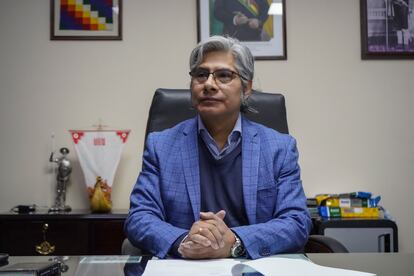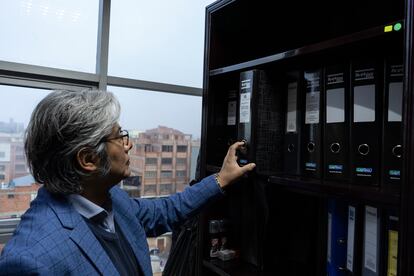Bolivia to investigate pedophilia in the Catholic church: ‘It’s our duty to history and the victims’
Attorney General Wilfredo Chávez is launching the probe after EL PAÍS published a story about a Spanish priest who abused children at boarding schools for decades and was protected by church officials

On April 30, the attorney general of Bolivia, Wilfredo Chávez, was with his wife, enjoying what was meant to be a quiet vacation over the May Day holiday, when a news story changed their plans suddenly. Both were returning by car from a shopping expedition and Chávez, 53, was sitting in the back of the car, checking messages on his cellphone. It was then that he came across a headline that, he says, shocked him into silence: Diary of a Pedophile Priest. A few minutes later, he showed the story to his wife.
“What are you going to do?” she asked.
“React,” Chávez replied. “React immediately.”
The Bolivian attorney general, who is a member of MAS — Movimiento al Socialismo, a political party led by former president Evo Morales— re-read the article once again. It was the story of the Spanish priest Alfonso Pedrajas, alias Padre Pica, who died in 2009 but left behind a secret diary explaining how he abused dozens of minors in various schools in Bolivia for decades going back to the 1980s, and how his congregation, the Society of Jesus (better known as the Jesuits) protected him. The diary came to light after a nephew of the deceased found it in an attic and showed it to EL PAÍS.
Chávez wrote a tweet announcing an investigation, and events began taking place over the following days: Chávez filed a formal complaint and also asked Spanish public prosecutors for background on the alleged attacker. Meanwhile, the Jesuits took action against eight former high-ranking officials of the order accused of covering up for Pedrajas. The bishops of Bolivia asked for forgiveness, and the Society of Jesus provincial (the highest position of the congregation in the country) testified in court as a witness.
Chávez spoke with EL PAÍS in a video call to explain how this case has shaken the foundations of the Bolivian Church.
Question. What stage is the investigation at?
Answer. We are making progress. A committee of prosecutors has been formed, two people have testified on behalf of the Society of Jesus, and we are about to take statements from the eight suspended priests [former superiors of the order]. There has also been a search at the school [Colegio Juan XXIII, where Pedrajas confesses to having abused the most minors], a committee has been set up to verify [the abuses] and we are waiting for other procedures, including the most important one: the participation of the victims.
Q. Have the crimes passed the statute of limitations?
A. They have not prescribed in Bolivia. The Inter-American Court has determined that, in these cases, the rape can be likened to crimes against humanity.
Q. Is the diary strong evidence of abuse and its cover-up? It's a typed text file...
A. It is a piece of evidence that should lead us to check it against other evidence. That is why we have reached out to the Spanish Attorney General’s Office and, if possible, we want to get in touch with the relative [the nephew who came forward with the diary]. A statement by a direct relative would favor us greatly in the investigation. But it’s not the only evidence. Obviously there is also the testimony by the victims, both about the abuse and the cover-up, which is what we can sanction at this time. This man [Pedrajas] has died and the crime is intuitu personae [criminal responsibility is extinguished and cannot be transferred to third parties]. But the systematic cover-up is not. And we are going to [prosecute] that, above all, with the testimonies and the diary.
Q. What penalties might the concealers face?
A. They could have the same criminal responsibility as the perpetrator, depending on the conditions in which they participated in the act. There has been a systematic cover-up and it will be necessary to see who took part in it and to what extent. The penalty could be imprisonment or compensation for damages. There must be an exemplary compensation in all the ways established by jurisprudence.
Q. There are victims who have accused other Jesuits of abuse. Will this investigation address these cases if they are reported?
A. Of course. I said it from the beginning: this is not an isolated case.
Q. Therefore you are contemplating the possibility of opening a general investigation into cases of pedophilia within the entire Catholic Church in Bolivia, as other countries such as Belgium have already done?
A. That’s right. It is a duty to history and to the victims. I have been reviewing what has happened in other countries, how there has been a kind of truth commission that has opened up everything that should have been opened up in the Church. It is necessary to find out, on the basis of a basic concept of memory, truth and justice, how the Church participated in these cases, which are many. The complaints have surprised us a lot. At the international level, I have seen information [recent news of abuses in other Latin American countries] and we are requesting to speak with our peers in Mexico, Chile, Argentina, in short, on the entire continent, to see what general attitude we are going to take, perhaps make some pronouncement at the international level.

Q. The case of Padre Pica has roiled the media in Bolivia.
A. The news has been spreading, especially through social media. There is outrage there. Walls have been painted [graffiti asking for justice] in the places where the events took place and in schools run by the Jesuits nationwide. And it is being done openly. Groups of women, mothers and former students are speaking out and the problem is growing. What we regret is that there are some media outlets that are part of this power group [of the Church] that are working against it.
Q. Do you mean the fact that there are sectors and media outlets that see the investigation as an attack on the Church?
A. That’s right. Yesterday at the homilies we did not hear anyone asking victims for forgiveness in a sincere way. The bishops reacted by playing the victims before such an abominable, horrifying act. This reaction is out of place and confirms how the Church covers up for its peers. There are media outlets that are using their reporters to carry out a kind of political victimization. What political angle can there be in the fact that the attorney general has announced an investigation that was logical? We could not stand by and applaud such an internal situation in the country.
Q. The individuals accused of abuses and most of the potential concealers are Spaniards who were sent to Bolivia by the Spanish Society of Jesus. What responsibility does the Spanish Church have in all this?
A. The investigation has to look into this, too. Obviously, stigmatizing an entity is very complex, and I think that we must first obtain official information. We will have to ask the Spanish Church and the Society of Jesus for a response, considering that Pedrajas had done this before and had apparently discussed it with people [that he committed crimes] and they still sent him to Bolivia.
Q. Will you also ask the Vatican for information? One of the concealers reached a high-ranking position in Rome.
A. We have to do it through consular channels. Remember also that Pope Francis is a Jesuit. We have to stick to a homogeneous line of work and seek information where we can find it. And the Vatican is a source because, indeed, Father Marcos Recolons [one of the concealers] was in active duty at that time, and we also understand that he knew about it and was part of an important structure, first regional and then global.
Q. What would you say to the victims?
A. I would tell my brothers and sisters in this country who have been victims or who know something about this criminal act to get in touch with investigators. That there will be a special office to protect their integrity and dignity. The State will take all their statements and information, and we pledge our commitment to an investigation that will conclude with criminal sanctions. If Pedrajas can no longer be held accountable, there are still those who covered up the very serious events that took place. We are not going to stop until we have a final ruling and those responsible for criminal acts are serving their sentences and making full reparations. There must be an exemplary criminal sanction that will once and for all break the structure of systematic cover-up by the Catholic Church that existed in the country.
Sign up for our weekly newsletter to get more English-language news coverage from EL PAÍS USA Edition
Tu suscripción se está usando en otro dispositivo
¿Quieres añadir otro usuario a tu suscripción?
Si continúas leyendo en este dispositivo, no se podrá leer en el otro.
FlechaTu suscripción se está usando en otro dispositivo y solo puedes acceder a EL PAÍS desde un dispositivo a la vez.
Si quieres compartir tu cuenta, cambia tu suscripción a la modalidad Premium, así podrás añadir otro usuario. Cada uno accederá con su propia cuenta de email, lo que os permitirá personalizar vuestra experiencia en EL PAÍS.
¿Tienes una suscripción de empresa? Accede aquí para contratar más cuentas.
En el caso de no saber quién está usando tu cuenta, te recomendamos cambiar tu contraseña aquí.
Si decides continuar compartiendo tu cuenta, este mensaje se mostrará en tu dispositivo y en el de la otra persona que está usando tu cuenta de forma indefinida, afectando a tu experiencia de lectura. Puedes consultar aquí los términos y condiciones de la suscripción digital.









































